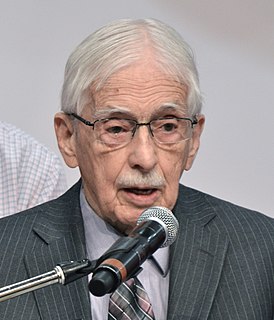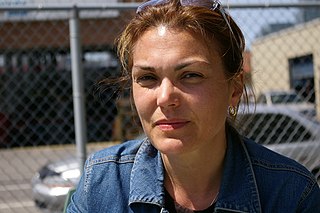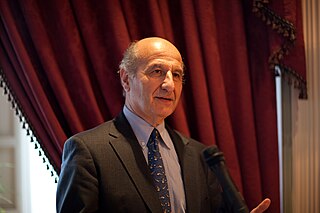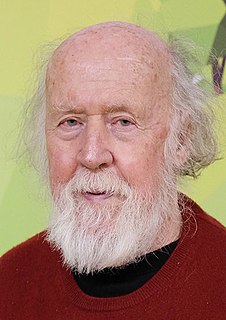Canadian literature is literature originating from Canada. Canadian writers have produced a variety of genres. Influences on Canadian writers are broad, both geographically and historically.
Sheila Leah Fischman, is a Canadian translator who specializes in the translation of works of contemporary Quebec literature.
A strong element in contemporary Canadian culture is rich, diverse, thoughtful and witty science fiction.
The Aurora Awards are a set of primarily literary awards given annually for the best Canadian science fiction or fantasy professional and fan works and achievements from the previous year. The event is organized by Canvention and the awards are given out by the Canadian SF and Fantasy Association and SFSF Boreal Inc. Originally they were known as the Canadian Science Fiction and Fantasy Awards which was shortened to CSFFA and nicknamed the Casper Awards based on that acronym, but this name was changed to the Aurora Awards in 1991, because the Aurora is the same in English and French. The categories have expanded from those focused on literary works to include categories that recognize achievements in comics, music, poetry, art, film and television.

Collège Jean-de-Brébeuf is a private, previously Jesuit French-language educational institution offering secondary school and college-level instruction in Montreal, Quebec. It is a co-ed establishment for students in their final year of secondary school and in college. It was boys-only for the first four years of secondary school. Now it is a girls and boys school. The school recently accepted girls in 2014. It retains a dress code, but no specific rules violating most clothing.
The Governor General's Award for French-language children's writing is a Canadian literary award that annually recognizes one Canadian writer for a children's book written in French. It is one of four children's book awards among the Governor General's Awards for Literary Merit, one each for writers and illustrators of English- and French-language books. The Governor General's Awards program is administered by the Canada Council.
The Governor General's Award for English-language children's illustration is a Canadian literary award that annually recognizes one Canadian illustrator for a children's book written in English. It is one of four children's book awards among the Governor General's Awards for Literary Merit, one each for writers and illustrators of English- and French-language books. The Governor General's Awards program is administered by the Canada Council.
Solaris is a Canadian francophone science-fiction and fantasy magazine.

Louis-Edmond Hamelin, is a Canadian geographer, professor, and author born in Saint-Didace, Quebec, Canada, best known for his studies of Northern Canada.
Canadian Literature is a quarterly journal of criticism and review, founded in 1959 and published by the University of British Columbia. The journal publishes articles which discuss and inform about the academic aspects of the Canadian literary field, and also a range of creative material from Canadian and international scholars, writers, and poets. Each issue contains a variety of articles and an extensive book reviews section. Rather than focusing on a single theoretical approach, Canadian Literature contains articles on all subjects relating to writers and writing in Canada. Each issue contains both English and French content from a range of contributors and has been described as "critically eclectic".
Neil Smith is a fiction writer who lives in Montreal, the city where he was born. His most recent book, a novel called Boo, came out in May 2015 with Random House imprints in the US, the UK, and Canada. The book is narrated by a young science geek named Oliver Dalrymple who finds himself in a heaven reserved exclusively for 13-year-olds. In addition to English, Boo has been published in Chinese, Czech, Dutch, French, German, and Portuguese. Publishers Weekly, Booklist, and Quill & Quire all gave the book starred reviews. The novel won the Hugh MacLennan Prize for Fiction and was nominated for a Sunburst Award, an Alex Award, and the Canadian Library Association Young Adult Book Award. The production company Fresh TV has optioned Boo for television.
The Association for Canadian and Québec Literatures (ACQL) is a learned society that supports research about Canadian and Québec literatures. Every year, the ACQL holds a conference with other scholarly groups during the Congress of the Canadian Federation for the Humanities and Social Sciences.
The BC Book Prizes, established in 1985, celebrate the achievements of British Columbia writers and publishers.
Judes Poirier is Canadian-born professor of Medicine and Psychiatry at McGill University and former director of the Centre for Studies in Aging at McGill University. He currently serves as director of the Molecular Neurobiology Unit at the Douglas Institute Research Centre and, co-founder and associate director of the Centre for the Studies on the Prevention of Alzheimer's disease at McGill University.

Véronique Morin is a Canadian science journalist who has worked for over 25 years to the dissemination and popularization of science.
Canadians in France are people born in Canada who emigrated to France, especially from French Canada. Those from the province of Québec are sometimes known as Québécois in France and Acadians a recent immigration of Acadians in France.
Angèle Delaunois is a Canadian author born in France and living in Quebec.

Olivier Bernard, known as the Pharmafist, is a Canadian science communicator who uses cartoons to counter pseudo-scientific myths. He writes the Pharmafist blog, the Pharmachien books and produces the television program Les aventures du pharmachien, denouncing ineffective or dangerous treatments.

Hubert Sacy is a social communications specialist and public figure known for his work in behavioral prevention and education. Since 1990, he has been Director General of Éduc’alcool, an independent, not-for-profit organization. He is well known for creating education and prevention programs in Quebec.






